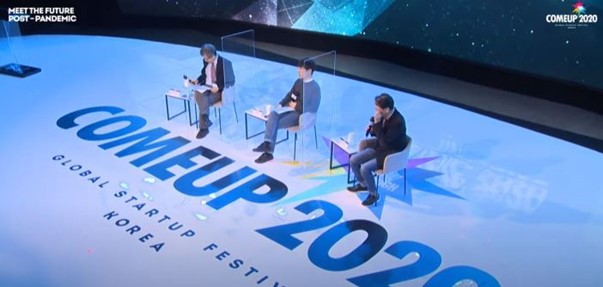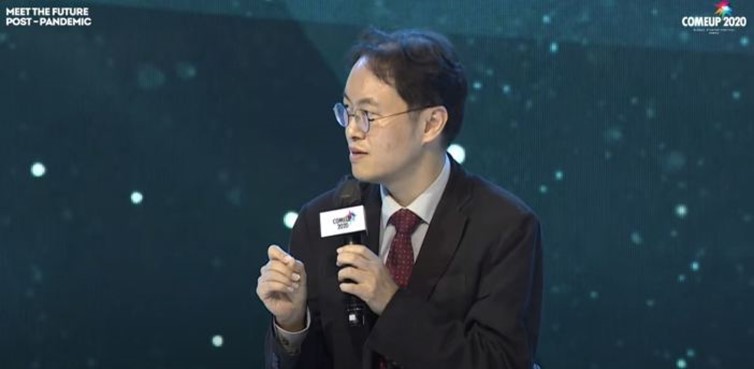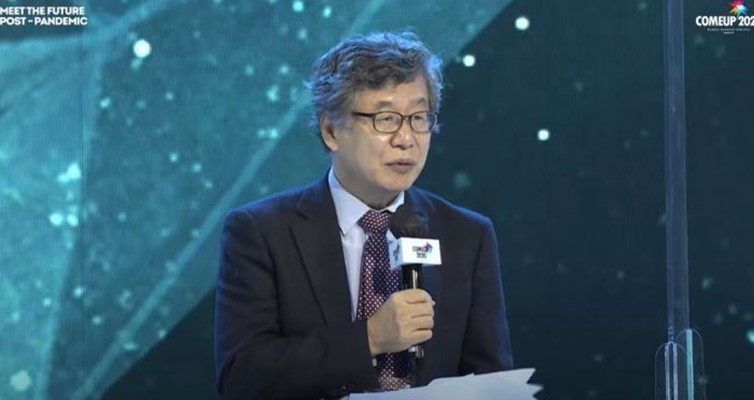The unexpected “negative COVID factor” has been affecting various sectors closely related to our lives, such as the way we work and the industrial ecosystem. Consequently, innovation ventures and startups gathered to look at the post-COVID era from a policy perspective.
On the first day of the global startup event “COMEUP 2020,” many opinions were shared on the topic of “New Governance in the COVID-19 Era” during a panel discussion in the politics session. Professor Lee Jae Yeol from Seoul National University participated as a chairperson, and Simon Kim, CEO of Hashed, and Lee Won Jae, CEO of LAB2050, participated as panelists.
“The changes predicted by the COVID pandemic are accelerating,” said professor Lee Jae Yeol, “Today, a digital economy with elements such as hyperconnectivity, big data, and artificial intelligence (AI) is being built.” Professor Lee asked for the panelists’ opinions on the current period.
First, CEO Simon Kim described the positive aspect of the digital economy.
Kim interpreted the possibility of change as the concept of a protocol economy. Protocol indicates a regulation that must be abided by. In such a system, human intervention can be eliminated, and more transparent competition can be achieved. “The platform model was most powerful in a time when the social structure was changing,” he described, “YouTube and Alibaba are examples. They achieved a bigger economy than everything centralized. However, many limitations, such as the issue of fees, arose. As a result, discussions about efficient decision making increased.” “A solution to this problem is being sought in the protocol economy model,” Kim emphasized, “There is a need for a project where shareholders and employees can be rewarded fairly, and the Bitcoin network searches for such project.”
Consequently, CEO Lee Won Jae advised about the aspect to be prepared for in the platform economy. He said that “whenever the great transformation came, the crisis came along.” He added, “The current system is based on the production method centering on large companies, but such structure has been collapsing through outsourcing and subcontracting even from the stage before the arrival of the platform economy.” After describing the situation in which the welfare state crisis theory is emerging, Lee pointed out that, although the free labor platform is expanding today, it must be evaluated whether such platform enjoys the same quality of life that the welfare state in the 20th century gave us.
Afterward, Professor Lee Jae Yeol asked regarding a regulatory system in the platform economy.
CEO Lee Won Jae responded, “As the protocol system is being built by someone’s design, regulations can also change in conjunction with central interests.” While mentioning the individual’s resistance to such a system today, he described that the question of whether individuals can sustain a stable livelihood in the importance and freedom of choice intensely given to them should be considered. He argued that the basic income system and, in a broader sense, the social security system will become critical.
Lee then asked Kim about the alternative to the opinion that conflicts and misunderstandings are growing in the globally customized information bubble.
As a response, Kim said that the “society is taking the form of hyperconnectivity, but the gap is widening because governance that can achieve hyper-consensus has not been established.” He argued, “A method could be creating a new political system by partially adopting a blockchain-based direct democracy system.”
Lee said the key is data. The question of who controls the data leads to the question of who has sovereignty. As a response, Lee was asked about countermeasures to preserve data sovereignty.
Lee emphasized the importance of principles. The distinction between ownership and use is important, and it should be made clear that the data from individual decisions and activities are entirely with the individual. He also added that, when personal data are used by others, a structure in which this revenue is returned to the individual must be established.
Finally, professor Lee Jae Yeol asked both panelists about how startup workers should pioneer the future.
Kim emphasized the importance for startups to think about various platforms in the period of shifting paradigms. Lee said that innovation must be accompanied by a strong social security system and a basic income system that many people can enjoy and that the foundation should be laid to achieve such necessary policies.
To conclude, Lee said, “80 years ago, Paul Valery, a French poet, said that ‘the problem in our time is that the future is approaching faster than ever.’ I am realizing this more these days.” He added, “The future is created based on the choices we make under different systems. It was a meaningful time in which I realized that governance must be created with a sense of direction and prepared for a creative future.”
“COMEUP 2020” was hosted by the Ministry of SMEs and Startups, COMEUP 2020 Organizing Committee, and Korea Institute of Startup & Entrepreneurship Development, and it was launched under the slogan “Meet the Future After COVID.” Speaker lectures and panel discussions were categorized into 3 major topics including “Social System,” “Work,” and “Life,” as well as 12 sessions including “Environment” and “Digital Healthcare.” The event was held online and untact due to the spread of COVID-19.



You must be logged in to post a comment.